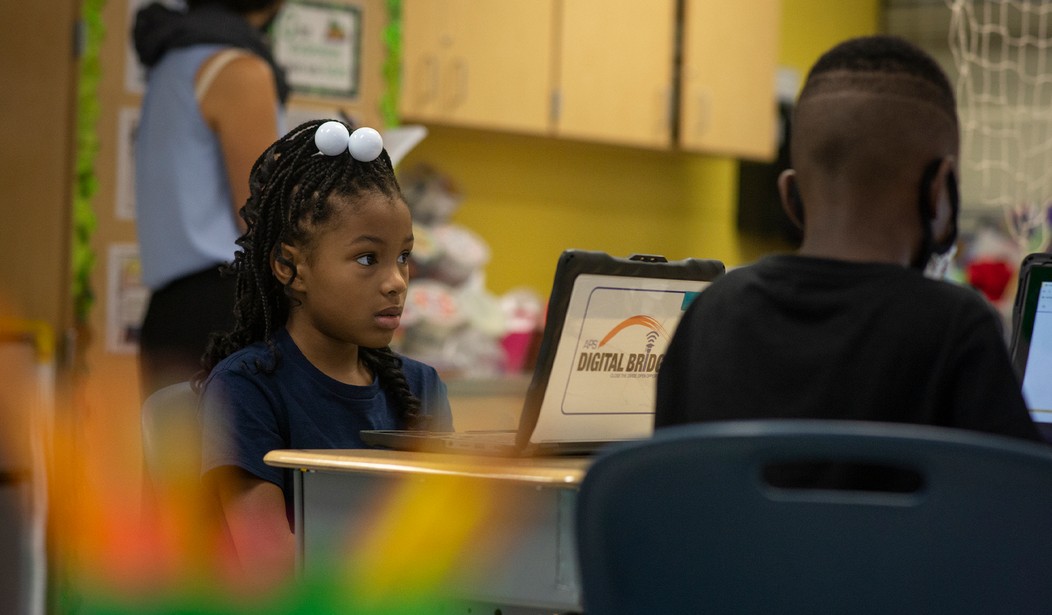There have been a lot of pixels expended in recent months on the failures of elementary education in the United States, but every once in a while, you find a bright spot; this just in from Alabama, where a return to some older practices is yielding good returns.
While the rest of the country’s schools were losing ground in math during the COVID pandemic, student performance in a rural Alabama school district was soaring.
Piedmont City schools notched significant improvement in math, landing in the top spot among school districts across the country in a comparison of scores from before and during the pandemic. Nationwide, students on average fell half a year behind in math, researchers say.
Piedmont, a 1,100-student district where seven out of 10 qualify for free or reduced-prince lunch, has stuck with an approach it adopted before the pandemic: It gave teachers more time to dig into data on students’ scores and lengthened classes to help them focus on specific skills.
“We made a total transformation about five years ago,” Superintendent Mike Hayes said. “We decided that we were going to let data make every decision.”
In other words, Piedmont teachers use test scores to see where kids are struggling and then target teaching to each kid. And then repeat.
Now there's a novel concept: examining data, looking at the results, and changing practices accordingly. Also, treating students as individuals instead of as cogs in a big machine. Imagine that!
The failures of education in the United States are largely due to this one-size-fits-all approach and to not allowing students to fail. Students now demand that grades meet their expectations, not standards, and their biases are reinforced by politicians, many of whom would themselves lose a battle of wits with a woodchuck, blaming everything but the individual students and their own teachers for failures to learn.
Personally, I would prefer to get the government out of education altogether, which, of course, isn't something that is likely to happen. The involvement of the federal government in education seems a pretty clear violation of the Tenth Amendment. But at the state level? It's constitutionally permissible, and it would be good for Alabama to take Piedmont City's example on the road.
Here's another novel concept: Set rigorous standards, enforce them, and - this is key - let students fail. The schools must be held to standards, and those standards must involve teaching math, hard science, reading and writing, history, and so forth; not environmental activism, not LGBTWTFBBQ+++, or any other such nonsense. If parents wish their children to learn such things, the home is the proper venue for that.
When I was a kid in the 60s and 70s, schooling - at least in Iowa - was quite a bit different than it is today. In those days, when the Iowa Test of Basic Skills was a national benchmark, students who didn't meet standards repeated a year. Students who were clearly capable of work above their current grade level were sometimes kicked up a grade or even two. Education was tailored not to the class but to the student. Having known a few kids who suffered the shame, and yes, it was a shame, of being held back, I can say with great certainty that those kids were motivated to make up the work, and their teachers were motivated to help them; I have no way of knowing but have the distinct impression that, in those days, teachers were to some degree held accountable for their student's success or failure. Failure is a great motivator.
Some years ago, our second daughter (now 31 and with three kids of her own) told her mother that the best thing we, as parents, ever did for her and her sisters was to let them fail. If they went to school and forgot homework that was due, they didn't get it rushed to the school by a parent; they had to explain things to their teacher and figure out how to make it good. Oh, we helped them study, and even in the mid-late 90s, we had to routinely fill in gaps in their educations that the schools didn't cover. But when they screwed up, it was on them. How we deal with failure, after all, is much more important than how we deal with success; I've always remembered the Old Man reminding me that "...failure is life's way of telling you to work harder."
And teachers must also be accountable, not for a student's failure in personal responsibility, but for their own failures to teach. This, of course, is the second step that would be invaluable in fixing education in our country: Proscribe public sector unions, especially teachers' unions, and make teachers accountable for the performance of their classes. Teachers who produce outstanding graduates should be rewarded; teachers whose students routinely fail should be cashiered. It is inconceivable that things should be otherwise.
The Piedmont City Schools are certainly moving in the right direction.
Right Angle's Bill Whittle, Stephen Green, and Scott Ott recently discussed the same kind of successes in Mississippi, and it's well worth the watch:















Join the conversation as a VIP Member